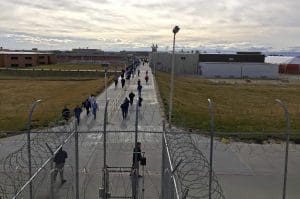Federal prison knowingly allowed sick inmates to expose others to coronavirus
The Bureau of Prisons continues to struggle with an exploding number of coronavirus cases in its prisons.

A federal prison complex in Louisiana that emerged as an early coronavirus hotspot — with hundreds of inmates suffering from the virus — failed to comply with federal health guidance and left inmates with the virus in their housing units for a week without being isolated, the Justice Department’s inspector general said Tuesday.
The inspector general’s findings after a remote inspection of the Federal Correctional Complex in Oakdale, Louisiana, comes as the Bureau of Prisons continues to struggle with an exploding number of coronavirus cases in its prisons.
Health officials have been warning for more than a decade about the dangers of epidemics in jails and prisons, which are ideal environments for virus outbreaks. Across the country, 182,776 inmates at state and federal prisons have been diagnosed with the coronavirus9, according to data compiled by the Marshall Project and the Associated Press.
In federal prisons alone, 140 inmates have died of COVID-19, including eight at FCC Oakdale.
The inspector general’s report alleges prison officials at FCC Oakdale failed to comply with the guidance from the Centers for Disease Control and Prevention and the Bureau of Prisons’ headquarters for isolating and quarantining inmates.
“Some inmates who had tested positive were left in their housing units for up to 6 days without being isolated,” the report concluded.
Correction officers and other staff members at the prison were also never told they would be interacting with inmates who had tested positive with the virus and were not given proper personal protective gear, the watchdog’s report said.
While top officials at the prison asserted they had an abundant supply of protective equipment on hand, staff members told the inspector general’s office they did not have proper equipment. The report also found that in some cases staff members “did not understand the necessity” of wearing proper protection when interacting with inmates who had tested positive for the virus.
In one instance, a staff member told investigators he didn’t have access to an N95 mask or a surgical mask when he was in close contact with infected inmates, and two others said they wore only surgical masks. One of those employees later tested positive for the virus.
Another employee said he didn’t wear an N95 mask while escorting sick inmates to a local hospital “because his supervisor told him that he did not need to wear one,” the report said. Union officials said some staff members refused to escort sick inmates because they weren’t given the appropriate gear.
In early April, the Bureau of Prisons told the AP that local health officials told the federal government there was no need to test inmates anymore for the coronavirus and those showing symptoms should be presumed to have it. But a spokesman for the Louisiana Department of Health said at the time that officials did not tell the prison to stop testing prisoners. He said state officials advised the prison, in the absence of testing, to isolate prisoners with symptoms.
The report also found that an outbreak at the prison forced correction officers to work longer shifts and in some instances as long as 40 hours straight, a chronic issue within the federal prison system.
In a statement, the Bureau of Prisons said it identified areas where its strategies to mitigate the spread of COVID-19 were not being applied consistently and began remedies, including changing personnel. The agency said the remedies “essentially mirrored” the issues identified in the report.
For years, union officials have been sounding the alarm about the chronic understaffing within the Bureau of Prisons, though the system allows for the use of excessive overtime. There’s nothing stopping guards from working multiple shifts per day, and the staffing levels have reached a point where officers at some facilities, such as the New York City jail where wealthy financier Jeffrey Epstein took his own life, work mandatory overtime nearly every week.
The report is the result of remote inspections being conducted by the inspector general’s office after Attorney General William Barr asked Inspector General Michael Horowitz to take a look at the federal prisons that were emerging as hot spots and identify any concerns and ways the Justice Department could improve the work being done.
Recommended

Biden calls for expanded child tax credit, taxes on wealthy in $7.2 trillion budget plan
President Joe Biden released his budget request for the upcoming fiscal year Monday, calling on Congress to stick to the spending agreement brokered last year and to revamp tax laws so that the “wealthy pay their fair share.”
By Jennifer Shutt, States Newsroom - March 11, 2024
December jobs report: Wages up, hiring steady as job market ends year strong
Friday’s jobs data showed a strong, resilient U.S. labor market with wages outpacing inflation — welcome news for Americans hoping to have more purchasing power in 2024.
By Casey Quinlan - January 05, 2024
Biden’s infrastructure law is boosting Nevada’s economy. Sam Brown opposed it.
The Nevada Republican U.S. Senate hopeful also spoke out against a rail project projected to create thousands of union jobs
By Jesse Valentine - November 15, 2023








































































